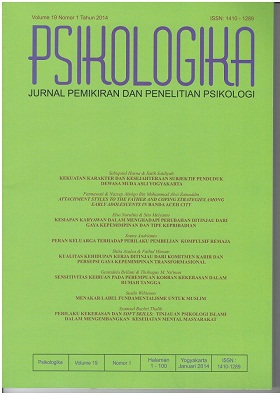Main Article Content
Abstract
The purpose of this research is to understand the correlation between character sti'engths and subjective well-being. The subject of this research is 50 of young adult native of Yogyakarta. Hypothesis in this research is there is a positive relation between character strengths and subjective vjell-being in young adult native of Yogyakarta. Sampling techniques that is used by this research is purposive sampling. This research use quantitative method. Collecting data tool used is character sti'engths and subjective well-being scale. Data was analyzed using product moment correlation techniques from Pearson by SPSS 16.00 for Windows. Result shows that there are positive correlation between character strengths and subjective well-being in young adult native of Yogyakarta. It is shown by positive correlation coefficient (rxy) of 0,713 and significance degree (p) ofO. GOO (p<0.001). Based on the result, it is said that hypothesis is accepted. Effective contribution character strengths to subjective well-being is shown by R square of50,8 that means 50,8% ofsubjective well-being in young adult native of Yogyakarta is influenced by character strengths. Score alpha for character strengths scale is 0.975, and score alpha for subjective well-being scale is 0.965.
Keywords: character strengths, subjective well-being
Article Details
Authors who publish with this journal agree to the following terms:
- Authors retain copyright and grant the journal right of first publication with the work simultaneously licensed under a Creative Commons Attribution-ShareAlike 4.0 International License that allows others to share the work with an acknowledgment of the work's authorship and initial publication in this journal.
- Authors are able to enter into separate, additional contractual arrangements for the non-exclusive distribution of the journal's published version of the work (e.g., post it to an institutional repository or publish it in a book), with an acknowledgment of its initial publication in this journal.
- Authors are permitted and encouraged to post their work online (e.g., in institutional repositories or on their website) prior to and during the submission process, as it can lead to productive exchanges, as well as earlier and greater citation of published work (See The Effect of Open Access).




